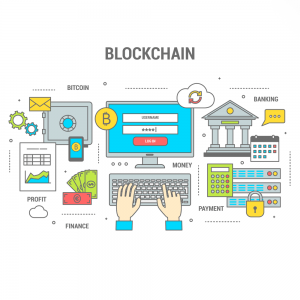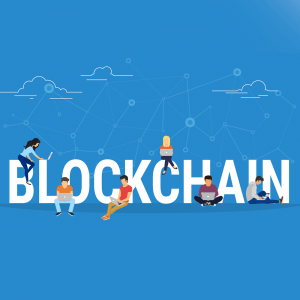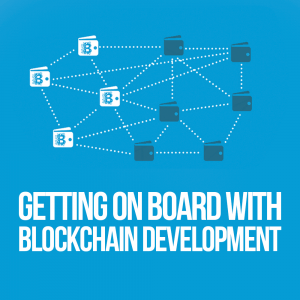Getting on Board With Blockchain Development
Blockchain has become a new buzzword in Silicon Valley due to its function as a distributed ledger that powers cryptocurrencies and bitcoins.
Already, blockchain is making an impact on the programming industry. Financial and technology companies invested $1.4 billion in blockchain technologies in 2016, including a $200 million investment from IBM in a blockchain-powered Internet of Things. The average blockchain project sees an investment of about $1 million.
90 percent of North American and European banks are exploring using blockchain. Companies such as Microsoft, Oracle, and IBM have already started investing in blockchain technology and making it part of their business.
Blockchain is gradually changing the world and, as a consequence, sets up new challenges for developers—especially if you want to work in this growing field. Many businesses are looking for blockchain developers with experience in creating and running distributed ledger systems.
However, in many cases, all that is required for a programmer interested in working on blockchain is a computer science or engineering background and understanding of the principles around blockchain systems.
Those developers who possess expertise in networking or security also have a chance to get a position in a blockchain project. The knowledge of Docker containers or microservice architectures increases the opportunity of finding a position in the world of blockchain.
It’s up to you to choose the direction of your blockchain development career path: whether you start as a junior developer or want to switch from your current software development position to a blockchain development job. Distributed systems and apps, bitcoins and cryptocurrencies, and distributed ledger technology are new technical challenges you might come across as a developer.
Those software engineers who possess a background in deep development languages might find themselves working for large corporate businesses on complex, transactional systems. For developers who are passionate about creating products from scratch, the better option will be joining a Fintech startup.
What Is a Blockchain?
Digital records are combined into “blocks,” which are then linked up with each other cryptographically and chronologically into a “chain” using complex mathematical algorithms. Each block is linked to the previous one and contains a set of records. New blocks are always added strictly to the end of the chain.
The essence of blockchain technology is in the distributed storage of information. For example, the blockchain can store data about financial transactions: the parties involved and the amount of money transferred.
The blockchain is an excellent example of how modern technologies can change, not only financial standards, but the whole world for the better. For example, it will eventually be possible to execute legal contracts with the help of blockchain. London-based company Selachii announced the launch of digitized contracts based on blockchain technology.
Imagine also a possibility to certify students with the help of blockchain. A student’s data is stored in a secure global data structure and couldn’t be deleted.
How Does It Work?

When new blocks are added to the chain, they are encrypted. The encryption process, known as hashing, is performed by a large number of different computers that run on the same network. If the computers all get the same result after the encryption calculations, the block then receives a unique digital signature.
As soon as the register is updated and a new block is formed, it can no longer be changed. Thus, it is impossible to forge it. You can only add new entries.
How Businesses Can Integrate Blockchain
The key advantages of blockchain technology are transparency and security. The actions of all participants are open, which prevents forgery of information. Due to the fact that there is no single data center, it’s impossible to delete data (for example, during a hacker attack).
For companies, blockchain is a means of cost reduction and simplifying many business processes. Blockchain technology might exclude some of the intermediaries in business transactions. It could also potentially save banks $8-12 billion in operations.
No wonder that blockchain technology has quickly become popular among companies from different industries. According to the forecasts of Transparency Market Research, by 2024 the global blockchain market will reach $20 billion.
Big enterprises have already started to integrate blockchain into their business structure. IBM, Oracle, and Microsoft are trying to adapt the technology of shared register to their activities.
For example, tech giant IBM has partnered with the blockchain startup Stellar and the payment company Kickex to launch a cross-border payment system for banks. The system runs on IBM Blockchain Platform, which is based on the Hyperledger Fabric. Their goal is to “reduce settlement time and lower the cost of completing global payments for businesses and consumers.”
Recently, Juniper Research named IBM the #1 blockchain vendor. Currently, IBM runs more than 400 blockchain projects with more than 1,600 employees and 150 open vacancies related to blockchain.
Today it takes days or even weeks to complete an international transaction. Thanks to the ledger-based system, a blockchain solution should minimize the possible errors and provide more flexibility to banks.
IBM states that this new service could possibly connect a farmer in Samoa with a buyer from Indonesia. The transaction could be accomplished with only one payment.
It’s expected that the integration of blockchain into the activities of large corporations will increase sales of cloud services, systems for processing databases, and servers by 35 percent. Right now, only 17 percent of companies with more than 1,000 employees use cloud services instead of their own data centers. Within five years, that number is expected to increase to 55 percent.
Enterprises are considering the use of blockchain in order to create more efficiency and exclude the need for central administration. Businesses are switching to blockchain, which opens new opportunities for programmers.
How to Start a Blockchain Development Career

Opportunities for developers seeking blockchain career opportunities are numerous, from financial institutions to the Internet of Things and insurance companies. Among companies who are building blockchain teams are startups, large tech firms such as Microsoft or IBM, and banks and government institutions like UBS and Barclays.
The best way to start a career as a blockchain developer is delving into Hyperledger, a platform for open source blockchain development that was launched in 2015 by the Linux Foundation.
Online Resources to Get Started
I recommend educating yourself on blockchain by reading and working on open source projects. You might wish to look for some formal training, but self-education is possible.
Here is a list of resources with tutorials, books, and open source projects that hasten your acquaintance with blockchain development and deepen your already existing knowledge.
If you are a beginner, start with reading Daniel van Flymen’s guide to building a blockchain.
Nicolas Dorier has prepared a guide on blockchain development with C#, which will be helpful for those developers who have C-based programming skills.
Important Skills to Have
I have looked through many blockchain development job ads, and here is the list of skills and requirements that I find to be most relevant:
- A BS/MS degree in Computer Science or Engineering is a huge plus. Additionally, at least 2 years experience as a software engineer.
- Understanding of algorithms, data security, decentralized technologies, and data structures.
- Solid background in coding skills with at least one of the following programming languages: Go, C, C++, JAVA, or Python.
- General understanding of ledgers, blockchains, and cryptocurrencies.
- Expertise in performance management and anomaly detection.
- At least basic experience in creating blockchain frameworks and business applications.
Many blockchain developers claim that it is possible to build a chain of blocks using any programming language. However, most blockchain projects are written in C/C++ with a lesser number of them written in Java.
Ethereum, a decentralized platform for applications, has the largest developer community and toolset. That’s why familiarizing yourself with it—and its programming language Solidity—can be a good start.
You should be adaptable and flexible if you want to be part of a blockchain development. Gavin Pacini from Deloitte’s EMEA Blockchain Lab says: “It’s not an established platform, so it’s a real learning curve… Tracks are being laid in front of us, and our job is to make the best use of that.”
Pacini also notes that self-education plays a crucial role.
You should not only possess technical skills but also understand the business case when working with blockchain. Niamh O’Connell from Deloitte’s EMEA Blockchain Lab explains: “Blockchain was getting a lot of hype, particularly last year, and this meant that people were keen to use it without understanding how it should be used in comparison to a traditional database,” O’Connell said. “We found that clients were coming to us with use cases that they wanted to explore, and after running workshops, we found that blockchain actually didn’t make specific sense for their business.”
For developers, understanding the concept of blockchain represents the paradigm shift in how they will write software in the future. Improving these skills will be invaluable for developers in the blockchain field, as it will not only help them to find a job but be successful in it.
Get on Board With Blockchain
We can definitely say that we are at the forefront of a new technology that will revolutionize the coding world.
Blockchain will solve many problems, especially in the transactional economy. That’s why it has already attracted the attention of many banks and companies.
Companies like SAP, Mastercard, and many others are already looking to hire blockchain developers. The blockchain is just starting to gain momentum, and you—as a developer— have a chance to catch this tide and win your lottery ticket.
| Published on Java Code Geeks with permission by Kate Kucherenko, partner at our JCG program. See the original article here: Getting on Board With Blockchain Development Opinions expressed by Java Code Geeks contributors are their own. |






Before investing time and money in blockchain development you need to understand what it can do and how you can use it. Today’s blockchain services go beyond financial transactions (such as bitcoin) and smart contracts and now include data streams such as those provided by MultiChain at http://www.multichain.com If all you want to do is modify your ERP so that you can exchange information with trading partners in a more secure fashion then instead of trying to write your own solution from scratch you might save time and money by using the MultiChain software to handle the peer-to-peer messaging. All… Read more »